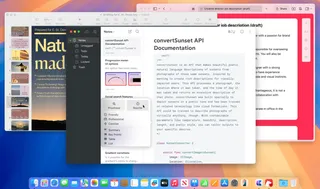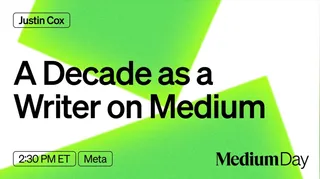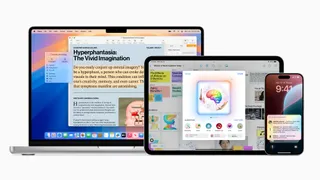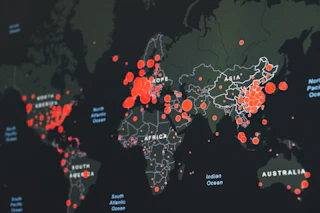Don’t Take My Word for It
This Just In: Personalized recommendations are the new algorithms and the best way to build a true audience.

I grew up watching Reading Rainbow. If you're a certain age, then the immediate response should be to start singing. If you're wondering what I'm talking about, well... take a look, it’s in a book.
Anyway, one of the cornerstones of each episode was the recommendations. Cinematic legend LaVar Burton would share his favorite books of the week and end by saying, “But you don’t have to take my word for it...” He wanted everyone watching to read the books for themselves and make up their own minds. And, to LaVar's credit, I did. At least, I did for a while.
One of the best features of early Netflix was its scarily accurate and nuanced recommendation system. Rent a few DVDs and all of a sudden Netflix would know you like "offbeat indie films with a strong female lead." That early algorithm helped me find films I hadn't heard of, but that math proved I would enjoy. Over the years, Netflix's recommendations have only gotten better, and now the app basically knows what I want to watch before I do. It's all kind of scary.
Netflix's algorithmic recommendations paved the way for social media's adoption of the technology. We spent over a decade with feeds elevating things the apps wanted us to see. This method of promotion was huge for some and helped expand their audience to new people. It worked for many people, myself included.
Over a decade later, things are changing. We still love our Netflix recommendations, but algorithmic-based social media is evolving as the web reinvents itself. While no one can exactly predict where everything is heading, we got a glimpse last week with the release of Arc Search.
Arc Search by The Browser Company is an AI chatbot turned search engine. Ask it a question, and instead of giving you a list of links to check out, the generative AI builds a webpage explaining your answer. I both like this idea as a form of convenience but also hate it as a form of discovery. While having the entire history of human knowledge at my fingertips is exciting, sometimes I have fun digging through details to find what I want (and also, finding what I didn’t know I wanted along the way).
We can debate whether Arc Search is a good idea or if it will help or hinder the web another time. Regardless of our feelings, this technology is clearly where major tech companies are investing time and energy. So, how are writers supposed to build an audience in this new world?
Well, it's time to return to the tenets of LaVar Burton. Personalized recommendations are the retro wave of the future. Sharing things we enjoy with each other is the best way to help grow an audience. While tech companies are largely chasing AI, some have caught on to a different form of promotion.
- Ghost, the open-source tool that runs my website and newsletter, has a recommendation feature. When you subscribe, you're introduced to a few fellow writers' work that I've hand-selected.
- Kagi, an upstart search engine, has a Small Web feature that acts similarly to the Stumble Upon of days gone by. It randomly opens a recent article from an indie website and has a button to move to the next random article. It's a great way to find new, hand-selected websites and writers who might otherwise get lost in the shuffle.
- Feedle, an RSS-based search engine, takes a similar approach and uses a little AI to surface interesting stories from independent websites in the catalog.
In addition to tech-based approaches, there's also the old-fashioned blogroll. A staple of the early web, blogrolls are listings of personal recommendations for other blogs. According to Matthias Ott's fantastic Own Your Web, blogrolls are making a well-deserved comeback!
Part of making the web personal again is relying on each other to share recommendations. While we might not have the mathematical precision to ensure our recommendations land, chances are if you like my writing, you'll probably like the writers I like, too. And vice versa.
As we collectively remake the internet, we can't be afraid to share what we like with our followers, friends, and families. Not only does it help independent writers like myself by reaching new people, but it's also a way to take back power from the algorithms that try to control us.
Share the things you like with the people you care about. It's a great way to support your favorite creators. But, you don't have to take my word for it.
Recommendation Station
What's the point of discussing how important individual recommendations are without making some of my own? Here are a few blogs/newsletters/websites I regularly read that are worth your time:
- 404 Media: Ghost enables fully independent journalism to thrive, and 404 Media is one of the new publications crushing it with tech coverage. The four-person team covers interesting angles you won't read anywhere else.
- All the Fanfare: One of the sites in my Ghost recommendation list, All the Fanfare, covers pop culture in a slightly different light. Articles are more in-depth, personal, and thoughtful.
- Bungalower: Every city needs a hyper-local news outlet. Here in Orlando, it's the Bungalower. If it's happening in a very specific part of town, these guys have it covered.
- Candid: I read Candid to keep up with changing trends in the nonprofit and philanthropy sector.
- Cerealously: The very first site I found with Kagi Small Web a few months ago was Cerealously. Now, it's a regular staple in my RSS feed. The site provides deep reviews of cereal. While it doesn't publish often, it's exactly the kind of stuff I love to read.
- Garbage Day: I don't always know what corner of the internet Garbage Day is covering, but I know it will be an interesting take.
- Platformer: The OG of high-quality, independent tech journalism is none other than Platformer.
- Rachelskirts: I've probably been following and reading Rachelskirts for nearly two decades. She posts about life, technology, and everything in between.
Quick Hit: How Ideas Are Born
To wrap up today, I want to take a moment to share how inspiration struck for today's column. It might give you a little insight into how my brain works and how it draws connections between strange things.
Writing Cooperative columnist Walter Rhein, who also wrote an amazing review of my book awhile back, responded to last week's question about AI with a nuanced question. In my email response, I found myself typing the following:
I think these more tailored and curated recommendations are more valuable than broad, algorithmic suggestions anyway. In fact, that might be the subject of next week’s newsletter…
Meanwhile, the Apple News feed started surfacing a ton of stories about the surprise word-of-mouth success of Anything But You. While I haven't seen the Sydney Sweeny-led rom-com, since it's by the team behind Easy A, it'll probably show up in my Netflix recommendations eventually.
Anyway, last week's media blitz threw a ton of stories my way about the film becoming a viral hit because of social media recommendations. Critics largely panned the film, but fans loved it. As such, the $25m movie made over $150 worldwide.
Reading these articles somehow connected with my response to Walter, and this week's newsletter was the result. Maybe the inspiration for next week's newsletter will come from pairing one of your email responses with one of the 11 tabs open on my phone. Who knows!





































































































